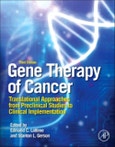Gene therapy as a treatment for cancer is at a critical point in its evolution. Exciting new developments in gene targeting and vector technology, coupled with results from the first generation of preclinical and clinical studies have led to the design and testing of new therapeutic approaches. The Third Edition of Gene Therapy of Cancer provides crucial updates on the basic and applied sciences of gene therapy. It offers a comprehensive assessment of the field including the areas of suicide gene therapy, oncogene and suppressor gene targeting, immunotherapy, drug resistance gene therapy, and the genetic modification of stem cells. Researchers at all levels of development, from basic laboratory investigators to clinical practitioners, will find this book to be instructive.
Cancer gene therapy, like cancer therapy in general, is evolving rapidly, testing new concepts, targets and pathways, evoking new technologies, and passing new regulatory hurdles. Its essence, however, has not changed: the hope and challenges of returning altered genes to normal, using targeted gene expression to alter the function of both tumor and microenvironment, and in some cases normal cells, and delivering functionally important genes to specific cell types to increase sensitivity to killing or to protect normal cells from cancer therapies.
In some instances, gene therapy for cancer forms a continuum from gene repair through the use of molecularly modified cells; the use of viral and non-viral vector based gene delivery to both tumor and tumor microenvironment; the use of viral and gene based vaccines; and development of new gene-based therapeutics. The unique mechanistically chosen vector platforms are at the heart of this technology because they allow for direct and selective cell death and transient to sustained delivery of vaccine molecules or molecules that affect the microenvironment, vasculature, or the immune response.
Please Note: This is an On Demand product, delivery may take up to 11 working days after payment has been received.
Table of Contents
Introduction; Overview of Viral and Non-Viral Vector Technologies; DNA Integration for Monitoring Outcome in Gene Therapy; Multiple Treatment Cycles and Gene Therapy; RNA interference-based therapy for cancer; Targeted systemic delivery of therapeutic siRNA; Lentiviral-vector Common Integration Sites; Selective Replicating Adenovirus and Tumor Necrosis; Cancer Suicide Gene Therapy; Adenovirus-retrovirus Hybrid Vectors ; Electroporation gene therapy; Biomaterials-based technologies for therapeutics and imaging; RNA Inhibition gene therapy; Monocytogenes-based DNA Delivery System; Toxin based Cancer Gene Therapy; Overview: Rationale use of oncolytic virus in clinical applications; Clinical development directions in oncolytic viral therapy; Selectively replicating herpes simplex viral vector; Oncolytic Vaccinia Virus for Cancer Therapy; Lister strain Vaccinia Virus; Modification of Mammalian Reoviruses; Systemic Delivery of Oncolytic adenoviruses ; HIF-activated Oncolytic Adenoviruses; Overview of Immune Targets and Pathways; Overview of Gene Therapy with Gene-modified T Cells; Genetically Engineered (TCR) T cells for adoptive therapy; Viral-based Strategies for Combined Vaccine/microenvironment Modulation; Dendritic Cell Vaccines; Recombinant Poxvirus Vaccines; Provenge® and Genetic Fusion Vaccines; Lentivector Vaccines; In vivo Immune Gene Therapy of Solid Tumours; Chemotherapy Delivered after Viral Immunogene Therapy; Overview: selecting effective targets for gene therapy of cancer; Targeting Telomerase-expressing Cancer Cells; Adenovirus-mediated shRNAs ; Adenovirus-mediated SOCS3 Gene Transfer ; p53-based Cancer Therapy; Strategies for tumor-directed delivery of siRNA; Overview of Drug Resistance and Manipulation; Clinical Trials using LV P140KMGMT for Gliomas; Delivery of Liposome-mediated MGMT-siRNA; Cytidine Deaminase Gene Therapy for Recurrent Cancer; Tissue Specific Gene Therapy; Radiation Therapy; Overview of angiogenesis and target identification; Combination of Notch and Ephrin- targeted Therapy; Effects of sustained VEGF blockade on the tumor microenvironment; Clinical studies of Aflibercept (VEGF Trap); Overview of Molecular Imaging Strategies Using Gene-based Vectors; NIS for Radio Gene Therapy; Genetically Engineered Salmonella; NIS Imaging in Cancer; Targeted systemic gene therapy and molecular imaging; Issues and Solutions in Moving Gene-therapy Approaches in Early Phase Trials; Safety and Innovation in Cancer Gene Therapy; Issues and Solutions in Moving Gene-therapy Approaches to Late-phase Trials; FDA Review Process for Cancer Gene Therapy








